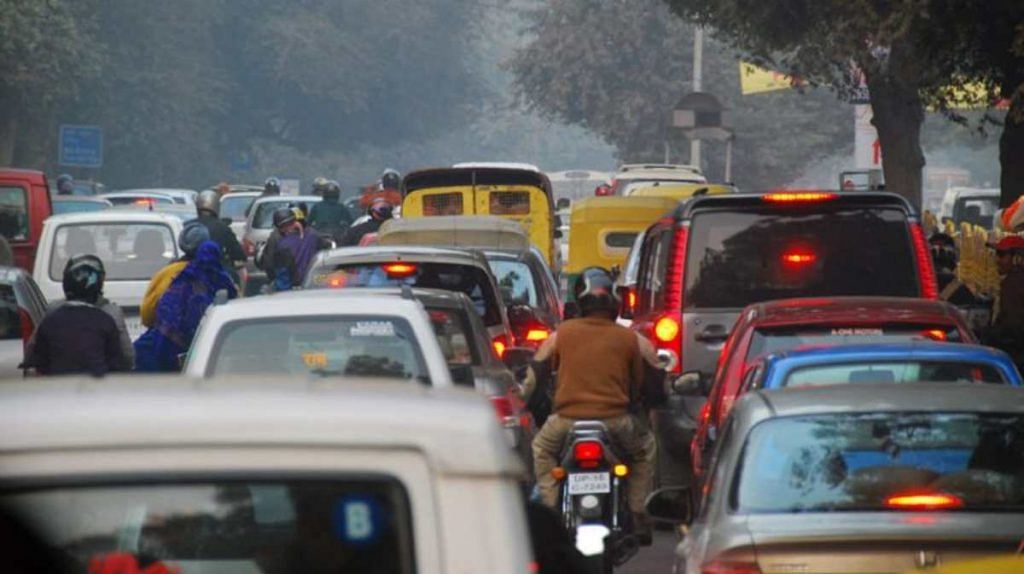New Delhi: The Union road transport ministry is considering rolling out the ambitious vehicle scrappage policy to phase out old polluting vehicles in a staggered way, ThePrint has learnt.
The voluntary policy will first cover commercial vehicles followed by private vehicles.
Senior ministry officials told ThePrint the ministry is in the process of firming up the contours of the policy, under which life of a commercial vehicle will be capped at 15 years and private vehicles at 20 years.
Union Finance Minister Nirmala Sitharaman had announced the policy in her Budget speech on 1 February.
A senior ministry official, who did not want to be named, said the phase-wise roll out is being proposed keeping in mind the limited infrastructure like automated fitness testing centres and scrappage centres that are available currently.
“The policy will be finalised soon,” the official said.
Once the policy is implemented, commercial vehicles, which are over 15-year-old, will have to get their fitness test done. If found unfit, their fitness certificate will not be renewed and they will have to go off the road and get deregistered.
To ensure that unfit vehicles don’t continue to ply on the road, the ministry is also considering increasing the penalty of plying old polluting vehicles.
“The idea is to disincentivise the owners from running old unfit vehicles,” a second ministry official said.
The government, the official said, is also planning to give financial incentives to the owner, in the form of waiver of registration fee, once he/she goes to buy a new vehicle after getting the old one scrapped.
Automobile manufacturers have been pushing for more financial incentives to the consumers to promote scrapping of old vehicles through formal scrappage centres.
Rajesh Menon, director general, Society of Indian Automobile Manufacturers (SIAM), told ThePrint, “The Indian automobile industry has been requesting that the scrappage policy should be accompanied by incentives in terms of rebates in GST, road tax and registration tax.”
“It is also important that fitness testing and certification be done at frequent intervals to ensure safety and environment friendliness,” he said.
Welcoming the government’s decision to roll out the policy, Menon added, “Besides major environmental benefits in terms of replacing old vehicles with BS-6 vehicles, there are also benefits in terms of reducing import bill in the long term by major recovery of metals through formalised scrappage centres.”
An analysis done by global management consultancy firm AT Kearney for the road ministry in 2017 had pegged the net economic benefit for the country to the tune of Rs 3,900 crore owing to savings from crude oil import and domestic steel scrap generation replacing imported scrap.
Also read: SC wants old cars off Delhi roads, but nobody knows how to go about it
Measures proposed in January to disincentives owners
In January, the road transport and highways ministry had proposed a slew of measures to ensure that vehicles, which are over 15-year-old, stay off the roads.
These included a steep increase in fee for renewal of fitness certificate for old commercial vehicles, increasing the fee for renewal of registration of private vehicles that are over 20-year old and imposing a hefty green tax on old polluting vehicles.
The ministry has proposed to increase the renewal fee for fitness certificate for commercial vehicles from the current Rs 200 to Rs 7,500. At present, it is mandatory for commercial vehicles, which are over 8 years old, to renew their fitness certificate annually.
For private vehicles, the Central Motor Vehicle rules mandate that registration has to be renewed once every 15 years.
“These measures will ensure that owners of older vehicles, especially commercial ones, find it financially unviable to ply on the road because of stringent compliances norms,” said the first official.
Challenges abound
But ministry officials admitted that despite being voluntary, implementing the scrappage policy will be challenging, primarily because of lack of supporting infrastructure.
India currently has just 7 automated fitness test centres.
“This is inadequate to cater to the market. More private players need to come forward to set up such centres,” the second official said.
Similarly, India currently has just two authorised scrappage centres.
Besides, the process to deregister vehicles also needs to be simplified.
“Presently, deregistering vehicles is a nightmarish experience for most owners who want to sell or get their old vehicle scrapped. It deters many owners interested to discard their old vehicles,” the official added.
The road ministry had in 2018 proposed to make vehicle scrapping mandatory from 2020 onwards. However, they had to put the proposal on hold after the Prime Minister’s Office did not agree to it and directed the ministry to make the scheme voluntary and consult states.
India has approximately 7,00,000 trucks, buses and taxis manufactured before 31 December 2000 that contribute 15-20 per cent of vehicular pollution, according to an analysis by AT Kearney based on data from the Central Pollution Control Board and road ministry emission norms.
Also read: Lack of incentives & infrastructure are hurdles to Modi govt’s plan to scrap old vehicles
